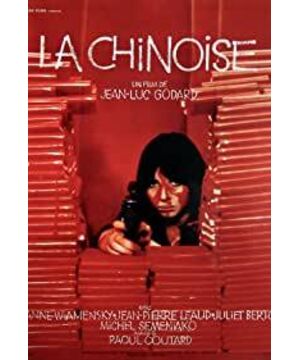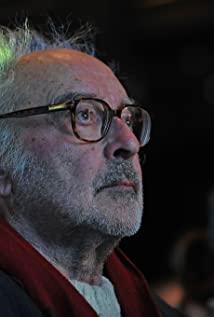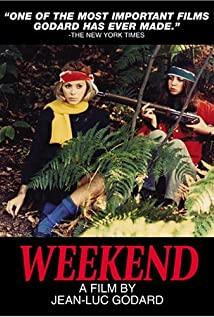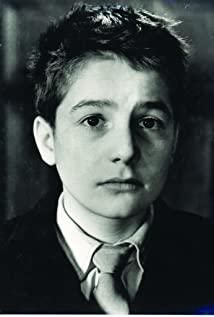These three afternoons were spent in the company of "The Chinese Girl". At night, I still wanted to watch it again. Later, the "Phoenix Coffin Mystery Case" attracted me... I regret it a lot. You said it would be good for me to know who the owner of the tomb is? Forget it, sorry shit! It doesn't do me any good to know what "Chinese Girl" is talking about, but the feeling of "exploring" it by myself is a little better than the feeling of being led by the nose with that long-winded host Zhang Tengyue -
well, "Chinese Girl" This film is about politics, no doubt about it. I think Godard used to have a strong interest in Marxism-Leninism and Mao Zedong Thought. Because of his interest, because he feels more acutely than others the inequalities and problems hidden in the capitalist society he is living in, he is willing to try to learn this new idea in order to find out the ills of the society and make a career. ...Actually, I suspect that Godard may not have the idea of "care about the country and the people" when he first came into contact with socialist thought. Socialist thought and culture may have been a popular culture at that time. Just like the "Che Guevara" fever that China has set off among young people now. So I really feel that when the heroine Veronica in the movie established the "Marxist-Leninist Communist Party" branch, she didn't really know why she believed in these so-called "isms" and what she should do after becoming a follower of Marxism-Leninism what.
A few people headed by Veronica hid in the room and kept learning Marxism-Leninism, decorated the apartment with a lot of small red books, and wrote Mao Zedong's quotations on the walls... Their daily work is to gather in the room to analyze the general trend of the world, Discuss the essence of Marxist-Leninist Mao Zedong Thought. Nor can it be said that their studies were ineffective, at least they realized that the Communist Party was divided into two factions. One is the real Communist Party that US imperialism must completely get rid of, and the other is the "revisionism" that the US can tolerate and is willing to lend a hand to. The political context in this film is actually many times more complicated than what I'm telling, but that's all I can see.
I only know that with the deepening of learning, the originally clear and simple beliefs seem to become complicated and blurred... The movie does not tell us this clearly, but when too many ideas appear in people's minds, our thinking will short circuit. The manifestation of short-circuit and confusion is that you can't sort out your thoughts, and you can only keep some broken pictures and flickering words in your mind... These things, Godard has clearly portrayed them with beating pictures.
Although the confusion and confusion did not weaken Veronica's enthusiasm, since the faith is no longer simple, of course there will be people who are not too "simple" trying to stay out of it. Possibly because of the translation of the film, I saw that the group eventually came up with a "revolutionary" plan, but didn't understand what it was. At the time of the vote, one person did not support the motion and eventually withdrew.
When telling this story, Godard used a lot of "obstacles" to try to disrupt the audience's sight. For example, in the movie, the reality of the person and the actor in the play is always intertwined, which makes it hard to prevent. Later, in the introduction to the movie on the cover of the DVD, I learned that Veronica's plan for their party branch was "to carry out a two-line struggle..." The most direct expression in the movie was that they decided to kill A person "made a name for themselves"... I'm sorry, I didn't understand who they were going to kill.
However, following the story of these "communists", problems also arise spontaneously. That is, can one person or several people start a revolution? Veronica thinks they can. However, this thought and belief was gently defeated by the words of the man sitting opposite her when Veronica decided to carry out her revolutionary practice on the train. It turns out that even after studying hard in the apartment, Veronica didn't really form an invincible theoretical system. If so, what was the point of the time they spent in that apartment?
At this time, the situation was already quite clear. No matter in the political situation or in the face of the Marxist-Leninist Mao Zedong Thought that made them fanatical, they were just a bunch of children who were just talking on paper and would only take it for granted. The man who had actually done the revolution who appeared on the train pointed out Veronica's naivety. He said that if there is no support from any organization or group, the revolution will not be possible. According to your theory, you will be arrested within three days...
The most incredible thing in the film is that Veronica already knew that the route and plan she made would not work, and she knew that they all failed, but at the end of the film she still quoted Mao Zedong as saying : "...This is just the first step in the Long March..." Veronica's stubbornness and refusal to give up did not win my respect. In contrast, I seemed to feel that Godard was standing not far away, looking at the head. Veronica, who was still reluctant to turn back in the dead end, sneered... Could it be that Godard's purpose in making this film was to satirize those blind, fanatical but naive "aspiring youths"?
This feeling intensifies as the number of videos viewed increases. I have no doubt that Godard may have been so enthusiastic when he was young, and when he can think about these phenomena calmly, it may be his own past that is ironic.
There are a lot of puzzling metaphors in the movie, such as the "Theater Zero" that appears in the ruins towards the end of the film and the performances in it... I didn't try to understand them all, since Godard deliberately made it difficult for people to To understand his intentions, it is obvious that my understanding may be one-sided or even wrong. However, I like this kind of film very much. The obscurity of the film means that different people will interpret it differently. That is to say, this political film has an infinite number of interpretation possibilities. I think that's why I've watched it three or four times in a row and still can't get enough of it!
In short, if you have a better understanding of the background of the time or have a deeper understanding of Godard's thoughts, I think there are still many surprises in this movie waiting for us to discover.
View more about La Chinoise reviews










